The Role Ethics of Epictetus
The Role Ethics of Epictetus
Stoicism in Ordinary Life
Brian Earl Johnson
LEXINGTON BOOKS
Lanham Boulder New York Toronto Plymouth, UK
Published by Lexington Books
A wholly owned subsidiary of The Rowman & Littlefield Publishing Group, Inc.
4501 Forbes Boulevard, Suite 200, Lanham, Maryland 20706
www.rowman.com
10 Thornbury Road, Plymouth PL6 7PP, United Kingdom
Copyright 2014 by Lexington Books
All rights reserved. No part of this book may be reproduced in any form or by any electronic or mechanical means, including information storage and retrieval systems, without written permission from the publisher, except by a reviewer who may quote passages in a review.
British Library Cataloguing in Publication Information Available
Library of Congress Cataloging-in-Publication Data
ISBN 978-0-7391-7967-3 (cloth : alk. paper) -- ISBN 978-0-7391-7968-0 (electronic)
 TM The paper used in this publication meets the minimum requirements of American National Standard for Information Sciences Permanence of Paper for Printed Library Materials, ANSI/NISO Z39.48-1992.
TM The paper used in this publication meets the minimum requirements of American National Standard for Information Sciences Permanence of Paper for Printed Library Materials, ANSI/NISO Z39.48-1992.
Printed in the United States of America
For my parents, who lovingly balanced so many roles
Preface
Why Epictetus? Throughout much of Western history, that question would have surprised a literate adult because Epictetus was held in high esteem as a popular spokesman for Stoicism. In turn, Stoicism enjoyed wide recognition for its ethics, one that was seen as both an alternative and complement to Christian ethics. As Thomas Jefferson wrote to a friend in 1819, Epictetus, indeed, has given us what was good of the Stoics... Epictetus [the Stoic] & Epicurus [the Hedonist] give laws for governing ourselves, Jesus a supplement of the duties & charities we owe to others (Thomas Jefferson to William Short, October 31, 1819).
It was only in the late 19th century that Epictetus and the Stoics were temporarily edged off the table. They went from being actively studied to being reshelved as German Idealists shifted away from Hellenistic thinkers towards Plato and Aristotle and Anglophone philosophers shifted away from ancient thinkers in general.
Such diminished status, however, did not last long. From the 1960s forward, Epictetus experienced a revival in scholarship and in popular culture more generally. Among academics, there has been a new recognition that Epictetus and the Stoics had produced philosophic work of greater sophistication and subtlety than previously thought. Scholars have come to recognize, for example, that the Stoics had been busy introducing innovations in logic and that their ethics was more nuanced than earlier portraits suggested. Among general readers, there has been a recognition that Epictetus and the Stoics still could speak to us across the ages about being human in an age of conflict. Perhaps the most striking example of this revival is the 1993 speech (and later monograph) by the decorated Vietnam war veteran and torture survivor James Stockdale. Vice-Admiral Stockdale titled his speech Courage Under Fire: Testing Epictetuss Doctrines in a Laboratory of Human Behavior, and that speech helped to make Epictetus a staple in U.S. military academies. Subsequently, Stockdale apparently inspired author Tom Wolfe to make one of his key characters adopt the philosophy of Epictetus in A Man in Full. And yet, even before these works, a modified version of Stoicism was already influencing popular culture through the original Star Wars movies. The Jedi Obi-Wan Kenobi willingly meets his own fate (as the Stoics recommend) and, invoking something much like the Stoics cosmic fire, he insists that there is an energy field that surrounds us and penetrates us... [and] binds the galaxy together.
My own interest in Epictetus and his role ethics arose from a fortuitous confluence of two events in graduate school. First, while trying out various time-management systems for tackling the unending to do lists that chase us all, I found myself especially helped by those authors who urged that we must first organize our activities around our basic values and then around our roles (or hats). I was struck by this idea of organizing my to do list around my roles because I implicitly conceptualized my life that way but, in practice, I was forcing all my tasks to fit on one master list. By organizing my activities around my roles, I found them easier to manage, to anticipate, and to prioritize. Second, while in a philosophy reading group at that time, I was assigned to present Epictetuss Discourses 1.2, titled How may someone preserve what befits his role in every instance? Epictetus there asserts that what is reasonable differs from person to person and that we judge what is reasonable, in part, according to our roles. On this basis, he uses roles to address questions of life or death and he connects such roles to our identity. In this discourse, then, Epictetus seemed to have put his hands on the deeper philosophic underpinnings of the commonsense idea I had just encountered, the idea that we organize our actions around our life roles.
I was thus hooked and I set about trying to make sense of what Epictetus had to say about roles. What are roles? How do we know when we have a role? Can we choose them or reject them? In researching these questions, I began with the assumption that my project would be a simple one. After all, Epictetuss point initially seemed very broad: in any ethical decision, we may refer to our roles in order to determine what is at stake. For example, the dominant Western ethical theories seem to agree that, barring extraordinary circumstances, parents should care for their children. A Kantian would account for this care-giving as the duty to regard ones child as an end-in-itself, an Aristotelian as the love and friendship necessary for happiness (or flourishing), and a utilitarian as activity likely to contribute to the general well-being. The parent-child roles, therefore, merely name the relevant circumstances to which a moral theory is applied, whether Kantian duty, Aristotelian happiness, or utilitarian goodness.
On that basis, I expected to write merely about how Epictetus highlights the relevance of roles to ethical reasoning. However, the more I searched out his account of roles, the more I came to see that Epictetus has a more original project in store. Epictetus has largely set aside the traditional Graeco-Roman talk of the virtues (justice, moderation, courage, wisdom) and replaced them with talk of roles. To a father who could not bear to be with his ill daughter, Epictetus does not speak of courage. Instead, he engages the father in a discussion about what is natural for a father to do. The discussion ends successfully with the father returning home to care for his daughter (Discourses 1.11). In much the same way, Epictetus even recasts the characteristically Stoic ethical obligations to be undisturbed about the fate of some external (like the death of a family member) as part of our role as human beings. Thus, he reframes his Stoic commitments into the language of roles and he shows how such a frame readily applies to the decisions we face in ordinary life as friends, family members, citizens, and professionals.
Moreover, in my research, I was surprised to learn that Epictetus makes these roles provide the bedrock justification for ethical action. As in the case of a parent caring for a child, Epictetus appears to hold that no other justification is necessary other than to say, I do this care-giving because I am a parent. Being a parent not only justifies action, Epictetus thinks, it motivates action precisely because such roles are intimately connected with our own identity. Roles serve to answer the question, Who am I?; role fulfillment thus becomes about fulfilling who one truly is. Finally, Epictetus gives these roles such weight that they might even conflict with one another. This possibility for conflict became especially clear to me when I studied Epictetuss treatment of Socratess roles because Epictetus implies that Socratess role as public philosopher was in tension with his private role as a father. Between these two roles, Epictetus believes that Socrates rightly sided with his role as a philosopher, but Epictetus equally grants that Socratess public philosopher role may not be right for the rest of us. In all these ways, then, Epictetus was offering his audience an ethics based on roles.
Next page
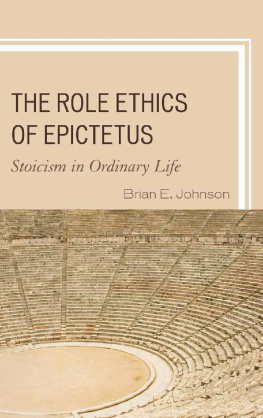
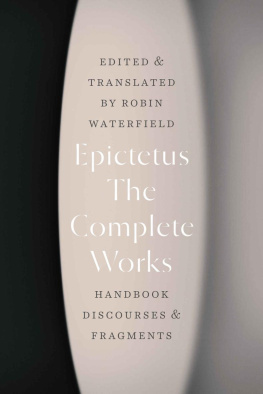
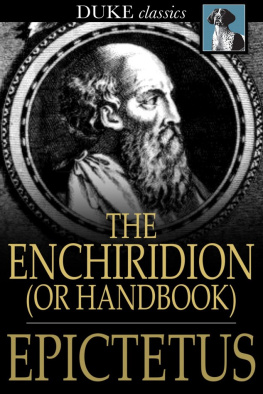
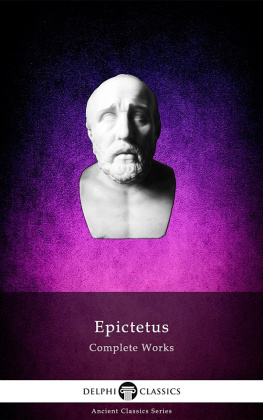
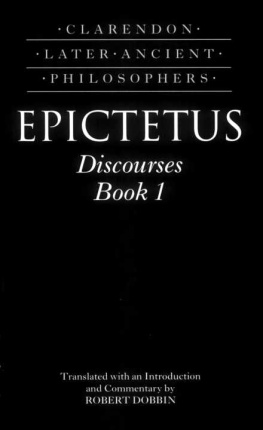
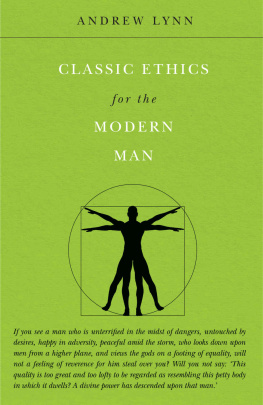
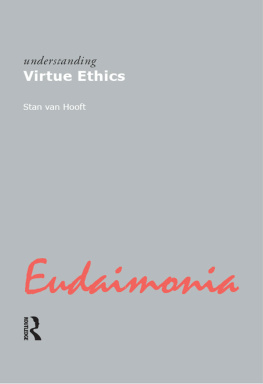
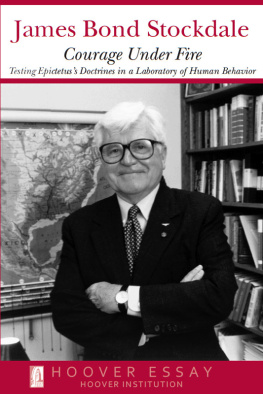
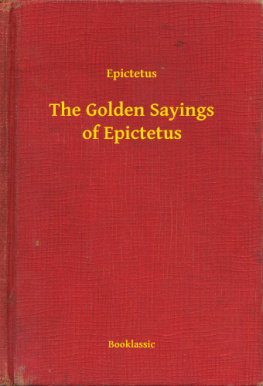
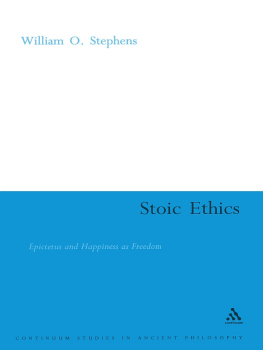

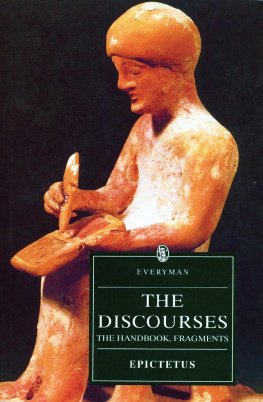
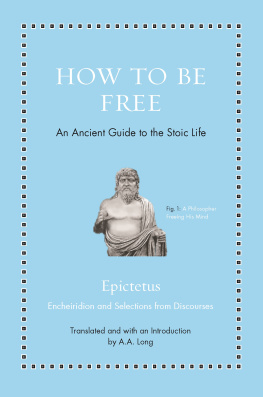
 TM The paper used in this publication meets the minimum requirements of American National Standard for Information Sciences Permanence of Paper for Printed Library Materials, ANSI/NISO Z39.48-1992.
TM The paper used in this publication meets the minimum requirements of American National Standard for Information Sciences Permanence of Paper for Printed Library Materials, ANSI/NISO Z39.48-1992.